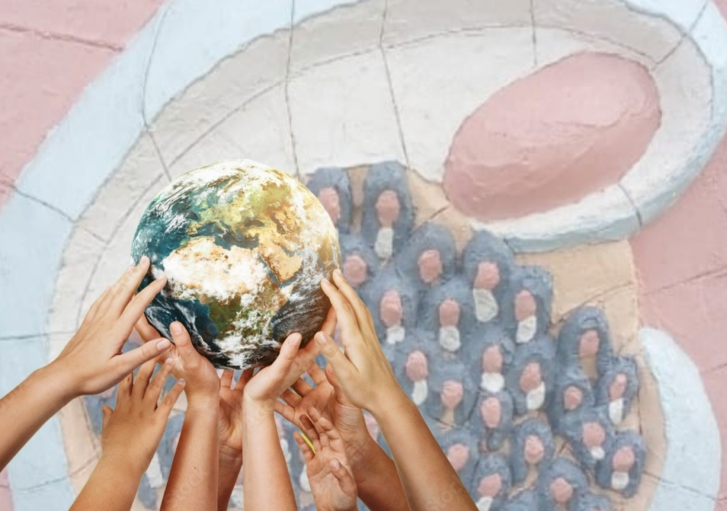
"LET US BE HOPE" - APRIL 2023
Let's walk together - Letter April 2023 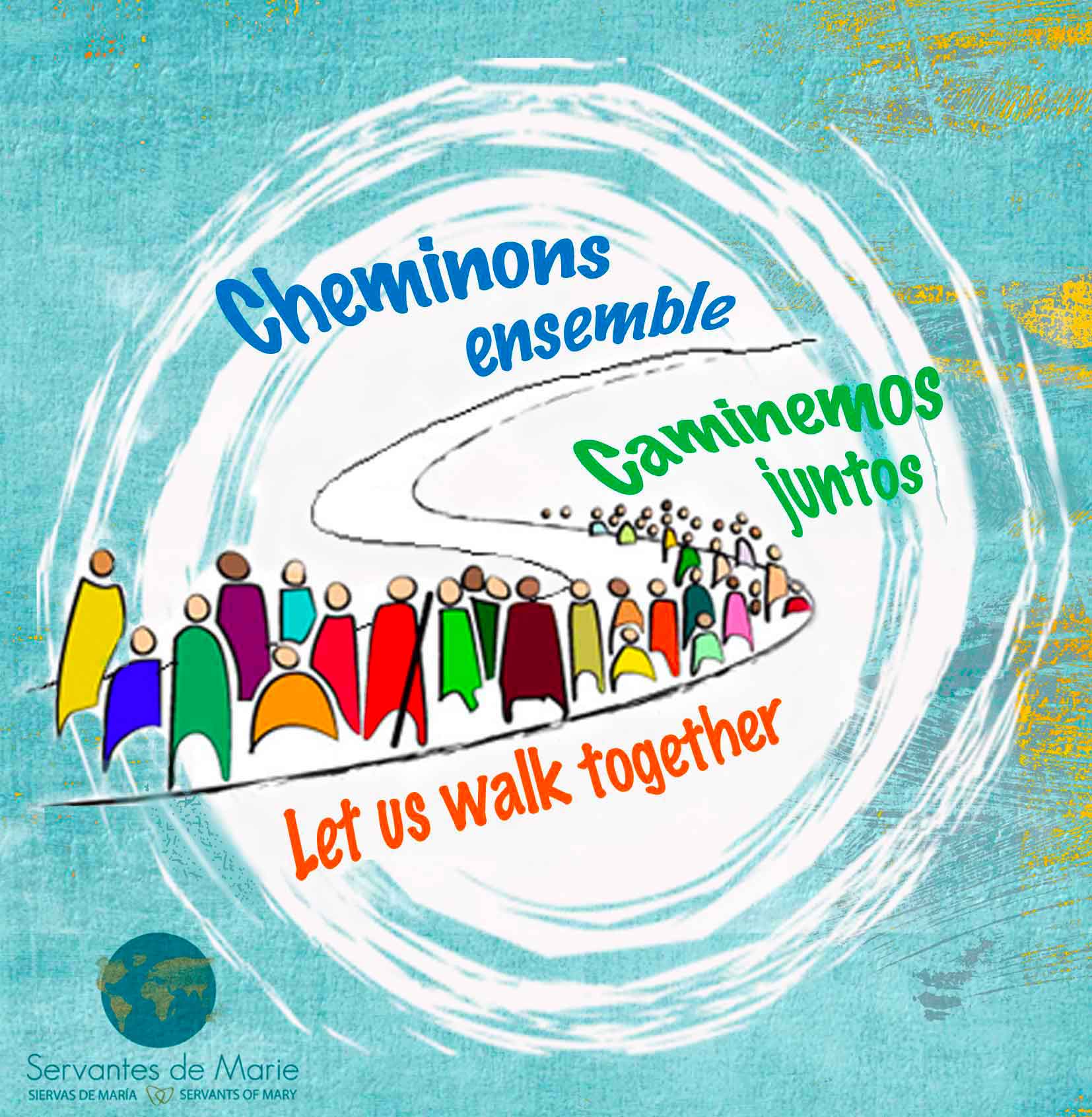

Dear readers,
We are meeting again this year, on the theme "Let us be Hope"; 3 letters will be published in April, August and December.
You will find below our first letter, in which we propose various texts to feed your reflection.
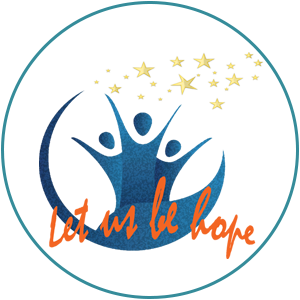 What is Hope?
What is Hope?
In French, there are two words to express this expectation: "espoir and espérance". In Spanish and English, one word: "esperanza" and "hope".
It is opposed to fear, discouragement, despair and anxiety.
"The will to hope, when there is no more hope, is called "espérance (hope)", said Jean-François Deniau, a former minister heavily affected by an incurable disease.
The hope is a more profane feeling than the espérance, it is the fact of waiting, of wishing something better for oneself and for the others: hope of a cure, good hope of success.
"Hope is not the expectation that everything will work out in the end, but the inner certainty that everything has a meaning", Vaclav Havel.
Hope is a pure and disinterested confidence in the future. It is a Christian virtue that originated in Judaism: believers confidently expect God's grace in this world and an eternal life after death.
"Hope invites us to recognise that there is always a way out, that we can always set a new course, that we can always do something to solve problems", Pape François.
Hope in the common vocabulary
- Life expectancy: this is the average length of life at a given time, a higher value for women than for men.
- Scientific expectation: a mathematical calculation related to the laws of probability, used for example in gambling to measure the degree of fairness. It gives the hope of winning, for example.
- The green, the colour of hope: associated with growth, Spring, the renewal of nature, youth.
- The anchor, symbol of hope: but also a symbol of firmness in faith. "We have this hope as an anchor for the soul, firm and sure." (Hebrews 6:19)

- Espérance: a name, feast day on 26 April. Saint Espérance is a child martyr of the second century, daughter of Saint Sophie of Rome. Nadia, name of Russian origin means hope.
- Géography: cape of Good Hope; rocky promontory in South Africa overlooking the Atlantic Ocean. Discovered in 1488 by Vasco da Gama, named by the King of Portugal who had high hopes of discovering "the road to India".
Authors and hope
- Georges Bernanos, French writer (1888-1948)
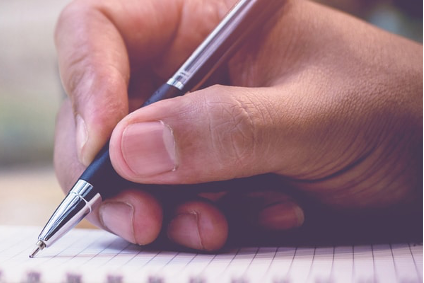
"Who has not seen the road, at dawn, between two rows of trees, all fresh, all alive, does not know what hope is. Hope is a heroic determination of the soul and its highest form is despair overcome."
"Hope is a risk to run. It is even the risk of risks."
For him, optimism and pessimism have in common that they do not make room for reality. The alternative choice is that of hope, which is always a victory and therefore a risk.
"The great misfortune of modern society, its curse, is that it is visibly organised to do without hope as well as love; it imagines that it can be replaced by technology, it expects its economists and legislators to provide it with the double formula of justice without love and security without hope."
- Charles Péguy, French author (1873-1914)
In "La petite espérance" (1912), e compares hope to a "little girl of no importance at all":
"The faith that I love best, says God, is hope.
What amazes me, says God, is hope.
And I can't believe it.
This little hope that seems like nothing at all.
This little girl hope.
Immortal...
Hope is a little girl of no importance at all...
It is this little girl who will nevertheless cross the worlds
This little girl of no importance at all
She alone, carrying the others (virtues: faith and charity), who will cross the past worlds.
As the star led the three kings from the depths of the East.
To the cradle of my son.
Thus a trembling flame.
She alone will lead the Virtues and the World."
- Jacques Ellul, protestant sociologist and theologian: "L’espérance oubliée" (1972)
For him, there is no such thing as hope. Hope is the maintenance of illusions. Hope is the opening towards another world, a setting in motion of the man to acquire his freedom, even if he knows that his step is desperate.
In his 1953 book, entitled "La liberté, pour quoi faire ?", he quotes the words of Bernanos: "Hope is a heroic virtue. One believes that it is easy to hope. But only those who have the courage to despair of the illusions and lies in which they found a security that they falsely took for hope, hope."
Hope in latin american authors
- Ernesto Sabato, "On heroes and graves" (Argentinean writer, painter and physicist)
"It is not ideas that have saved the world, it is not intellect or reason, but quite the opposite: these crazy hopes of men."
- Julio Cortázar, "Hopscotch" (Argentine writer, teacher and translator)
"Hope belongs to life, it is life itself that defends itself."
- Jorge-Luis Borges, "Interview 16" (writer, poet, essayist)
"I believe that our duty is hope, probable hope, credible hope."
- Eduardo Galeano (Uruguayan journalist and writer)
"For me, hope is something that I have when I wake up, that I lose at breakfast, that I recover when I get the sun in the street and that, after walking for a while, it moves to fall through a hole in my pocket. And I say to myself, "Where is the hope?" And I look for it and can't find it. And then, reaching out, I hear it there, croaking like a tiny toad, calling me from every pasture. I have her, I lose her again. Sometimes I sleep with it and sometimes I sleep alone. But I have never had a recipe for hope bought in a dress shop, a dogmatic hope. It is a living hope and, therefore, not only is it not free from doubt, but it feeds on doubt." - Article in the newspaper La República de Montevideo
"Hope is a risk we must take." - "The Book of Hugs"
- Gabriel García Márquez, "Love in the Time of Cholera" (Colombian writer and journalist)
He says that there is still hope, that life is more eternal than death, he says that we must continue to pursue our dreams, that we must correct our mistakes, that we must make ourselves worthy and that, even if the times of cholera come, there will be space for love, for dreams, for happiness. And he says that pain is part of tomorrow's happiness, that dreams must be pursued...
- Isabel Allende (Chilean writer)
"It is a wonderful truth that the things we most desire in life - a sense of purpose, happiness and hope - are best obtained by giving them to others."
- Octavio Paz, "The maze of Solitude" (Mexican poet and essayist)
"Whoever has seen hope does not forget it. He seeks it under all skies and among all men."
Hope in religions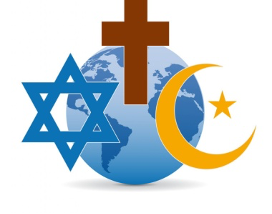
- In Judaism
"In Judaism, Jewish hope is the expectation of God's intervention in mankind: Every day, our afternoon prayer, the Amidah, ends with the call for the peace that the Lord will bring upon us. By following the commandments of the Torah, man is also called to repair the world by his own efforts." - Rabbi Yeshaya Dalsace
- In Islam
"The hope of Muslims is turned towards God. Hope is inseparable from love and fear (the three stations of faith). Hope can only be lived individually if it has a collective and universal scope. Love and hope for others what you love and hope for yourself... By being merciful in our turn, we will be a help and a hope for them." - Imam Ahmed Miktar
- For Christians
Hope is one of the three theological virtues, along with faith and charity: a virtue that must guide the women and men who make up humanity in their relationship with the world and with God, whose main object is salvation, eternal beatitude, and participation in the glory of God. This virtue, which disposes the Christian to put his trust in the words of Christ, to rely not on his own strength but on the help of the grace of the Holy Spirit, leads him by this very fact to resist evil and trial and to keep confidence in the future. Hope is expressed and nourished in prayer. It differs from hope by giving it, in the eyes of faith, a perspective of eternity.
"Man cannot live without hope and education generates hope. Indeed, education brings about birth and growth, it is situated in the dynamic of the gift of life, and the life that is born is the most gushing source of hope, a life tending towards the search for the beautiful, the good, the true and the communion with others for a common growth." - Pope Francis
- Religions have left their mark on the common vocabulary
In this case, the expression "À la grâce de Dieu... advienne que pourra" (to the grace of God... come what may): means that we rely on God, on Providence, on luck. These expressions come from "À Dieu vat", which means that everything that could be done has been done, is done, and that what happens next no longer depends on people except on God or luck for the unbeliever.
Among Muslims, we say "Inch'Allah", to evoke an action to be carried out in the future, we rely on fate, on God. It could be translated as: "If God wills it, if God allows it".
Some significant texts
- Inna Bokova, Director General of UNESCO (February 2017)
Russian proverb: "In the land of hope, there is no more winter."
- Preface to "Words of Hope", published on the occasion of the 70th anniversary of UNESCO's International Catholic Centre.
"Hope transforms the world… Far from being an escape from reality, hope is a demand, a faculty of anticipation, which gives us the energy to build together a world that is more just, more united, more equitable… Against the forces and discourses that seek to spread hatred, division and vengeance, racism and withdrawal, hope offers an antidote that is more necessary than ever."
- Gabrielle de Milleville, representative of the NGO Make Mothers Matters
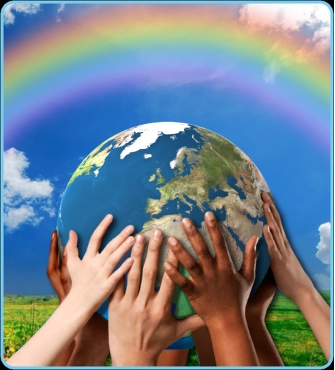 "Hope, breath of life
"Hope, breath of life
The jerky breath of the mother who gives birth to her child,
Powerful wind that breaks the bonds of childhood,
Providential breeze that dispels our uncertainties,
Fortifying breeze that creates life on hostile shores,
A gust of wind that carries us beyond to a profound joy.
Hope, the path of life
A path that offers itself to us from the first day,
A rocky path that leads us away from the abyss,
Sandy ground that seals the steps of eternal lovers,
A lighted road in the darkness of deep forests,
Land of welcome for our elders that opens up to life.
Hope, burning fire
Fire that devours our doubts and defiance,
Spark of light that illuminates our minds,
Flames that warm our darkened souls,
A blaze that inflames our aching hearts,
Soothing embers at the fall of life.
Hope, eternal sky
Heaven bursting with the joy of lovers contemplating the sun,
Benevolent vault of heaven that receives our prayers,
Glowing and comforting sky in the face of the pain of the twilight,
The starry night that keeps a peaceful watch over departed loved ones,
Offering them eternal hope, your hope."
- Cardinal Philippe Barbarin
Hope, an inner conviction that allows us to stand in the face of trial and to move forward despite the darkness.
A memory from July 2014, in Erbil with Patriarch Sako:
The Christians have just been expelled from Mosul. The families have not been dislocated, there have been no deaths, but they have all had to leave their homes and their city, leaving everything behind.Tears come down on the faces; I see them flowing from the pastor's eyes too. Then suddenly the story drifts. "It's over; there's no future for us!"
Immediately I see my dear Patriarch stand up and call out to his followers: "Don't sin in despair. You are already suffering enough as it is!" Christian hope is not the illusion that the situation will improve tomorrow. We were not going to say to Jesus on Holy Thursday evening: "Don't worry. Judas has just betrayed you, but tomorrow things will be better." No, the next day he would be crowned with thorns and die on the cross! Then, with a loud cry, Jesus said: "Father, into your hands I commend my spirit." (Lk 23:46)
Archbishop Sako explains: "This is Christian hope. It is the conviction that, even if we go through terrible trials, we will always remain in the hands of a God who loves us as a Father."
A prayer of hope to finish or to nourish our reflection
"Lord, teach me to hope." - Jean-Yves Baziou
To hope is to breathe
The Bible teaches us that man is born of the breath of life that "Yahweh blew into his nostrils". "He who is born of breath is free as the wind", the Gospels whisper to us. The breath? No one knows where it comes from or where it goes: it is what carries us further than the present. Lord, transform me into a mobile being, curious to breathe an ever-changing air.
To hope is to walk
Walking is a marvel that says we are not tied to a given environment, that we are always looking for our way. We never stop changing, experiencing that we only come to ourselves by always surpassing ourselves. Lord, give me the ability to start again and again.
To hope is to be on the way
We have not arrived and we are still looking for the goal. Man is neither from here nor from elsewhere. He is in-between, he is always happening. We are migrants. Lord, teach me to love this great migration that is life.
To hope is to desire
That is, to live in the world as if we could not bring ourselves to stay there. We are never satisfied with established homes. Wherever we live, we look further ahead, towards futures. Lord, cultivate in me the energy of desire.
To hope is to imagine
Man is never fully there where his feet put him. He is greater than what he is. He who hopes can walk through walls. Lord, awaken in me the unimaginable of your Word.
To hope is to be filled with the future
Our history never stops waiting for us. To become what we are not. Man sets out to be himself. And he becomes only on the condition that he knows how to pass. No one finds himself unless he accepts to lose himself. Lord, make me pass, cross over, go from me to the other.
To hope is to trust in the future
To trust "in the grace of God", that is, to be guided by what comes, by others, by events. To hope is to accept to let oneself be and to be born in every encounter. He who hopes dares to put himself in the hands of the other. Hope is a gesture that commits us to a risky game whose outcome is unknown. Lord, before you, with you, I say "yes" to the unknown of life.
